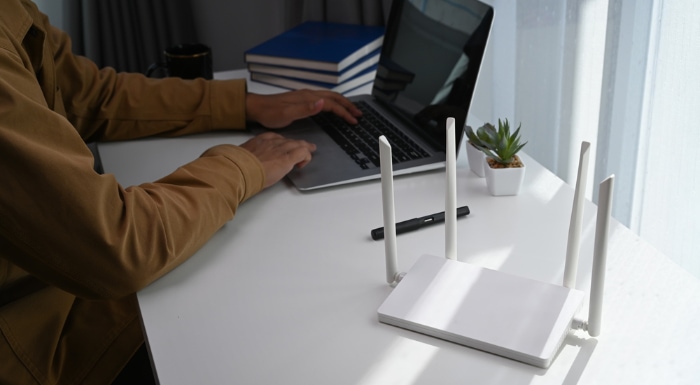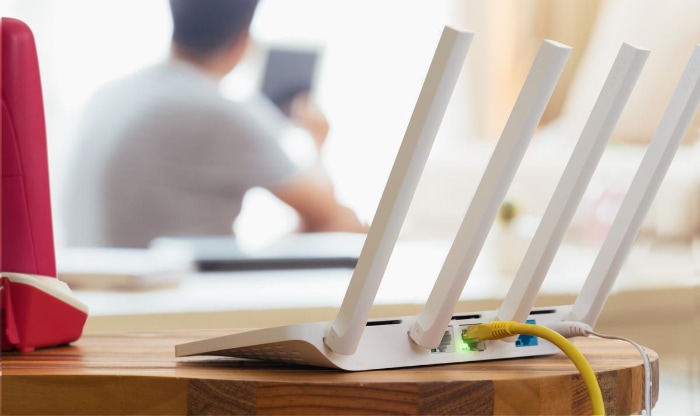Renting vs. Buying a Router: The Internet User's Guide

Choosing between renting and buying a router from your Internet Service Provider (ISP) might seem like just another checkbox in setting up your home internet. However, this decision carries more weight than you might expect.
It's not just about the device that sits quietly in the corner of your room; it's about how you engage with the digital world. Your router is your gateway to the internet, influencing everything from your streaming quality to how swiftly your smart home devices communicate.
Understanding Router Rentals
Renting a router from an Internet Service Provider is a common practice for many households. It's often seen as the hassle-free way to get online quickly. But what does it really entail?
What Does Renting a Router Mean?
When you sign up for internet service, ISPs often offer a router for a monthly fee. This router is the property of the ISP, and you pay to use it as long as you're their customer.
It's a simple setup: the ISP provides the router, and you plug it in. No need to worry about selecting, buying, or setting up hardware – it’s all done for you.
Terms and Conditions of Rental
Router rentals come with specific terms and conditions. ISPs typically cover maintenance and replacement if the router malfunctions.
However, there are usually limitations. For example, if the router is damaged due to negligence, you might be liable for the cost. Understanding these terms is crucial as they outline your responsibilities and what the ISP is obligated to provide.
The Convenience Factor
The main allure of renting a router is convenience. You don’t need to research the best model or worry about compatibility with your ISP’s network.
It's a plug-and-play solution, ideal for those who prefer not to dive into the technicalities of home networking. Additionally, ISPs often update rental routers to ensure they are up to date with the latest standards and technologies.
The Financial Implications of Renting
The decision to rent or buy a router is not just a technical choice but also a financial one. While renting a router from your ISP might seem like a small addition to your monthly bill, the costs can add up over time.
Monthly Rental Costs
Typically, ISPs charge a monthly fee for router rentals. This fee is added to your internet service bill.
While the amount may seem nominal, usually ranging from a few dollars to around $15 per month, it's important to consider the cumulative cost. Over a year, even a $10 monthly rental fee adds up to $120.
Comparing Rental Costs to Buying
When you buy a router, the upfront cost can range from around $50 for basic models to several hundred dollars for high-end ones. This one-time expense might seem steep compared to the small monthly rental fee.
However, if you compare the total rental fees over a few years to the purchase price of a router, buying often comes out as the more economical choice in the long run.
Long-Term Financial Considerations
Over several years, the cost of renting can far exceed the price of a router. For instance, over five years, you could pay over $600 in rental fees, significantly more than the cost of most routers available in the market.
Moreover, owning a router means you have an asset; even if you switch ISPs, you don't need to rent another router. It's also worth considering that routers often have a lifespan of several years, which can further extend the financial benefits of buying over renting.
Performance and Technology Aspects
The performance and technology of your router play a pivotal role in your overall internet experience. This is where the choice between renting and buying becomes crucial.
Rented routers may not always be the latest models, potentially affecting your internet speed and connectivity. On the other hand, owning a router gives you the freedom to select a model that best suits your needs and take advantage of the latest technology.
Latest Technology and Performance Upgrades
When you buy a router, you have the liberty to choose from a range of models, including those with the latest technology. This could mean faster speeds, better range, and more advanced features like improved security protocols.
In contrast, rented routers from ISPs are often standard models that might not offer these advanced capabilities.
Impact on Internet Speed and Connectivity
The router's technology directly impacts your internet speed and the efficiency of your home network. Newer router models support faster data transfer rates, which is crucial for activities like streaming high-definition videos, gaming, and handling multiple devices simultaneously.
Rented routers may not always provide these speeds, especially if they are older models.
Advantages of Owning a Router for Specific Needs
Owning your router allows you to tailor your home network to your specific needs. For instance, if you have a large home, you might opt for a router with a broader range or a mesh system to ensure consistent coverage.
Similarly, if you have smart home devices, choosing a router with better IoT support can enhance your experience. This level of customization is often not possible with standard rented routers.
Customization and Control

Customizing your home network to fit your specific needs is a crucial aspect of your internet experience. Renting a router often means you're limited in terms of the settings and updates you can control.
Owning your router, however, opens up a world of possibilities for customization and control.
Limited Customization with Rented Routers
Rented routers from ISPs typically come with pre-configured settings that are optimized for general use. While they may cover basic needs, they offer limited scope for customization.
Adjusting advanced settings like parental controls, network prioritization, or even simple changes like updating the network name and password can be restricted or more complex in rented devices.
Full Control with a Purchased Router
Owning a router empowers you with complete control over every aspect of your home network. You can choose to update the firmware to the latest version, tweak settings for optimal performance, or enhance security measures.
This level of control is particularly beneficial for tech-savvy users who want to optimize their network for specific activities like gaming, streaming, or operating a home office.
Importance of Router Customization
The ability to customize your router settings goes beyond mere convenience. It allows you to create a network environment that supports your unique lifestyle.
Whether it’s setting up a guest network, managing how bandwidth is distributed among devices, or ensuring robust security protocols, owning a router gives you the freedom to tailor these aspects to your exact preferences. This level of personalization is especially important in households with diverse internet usage patterns and multiple connected devices.
Maintenance and Support
The aspect of maintenance and support for your router is a significant factor in the renting versus buying debate. Each option comes with its own set of responsibilities and benefits.
While ISPs typically handle maintenance for rented routers, owning a router means taking charge of its upkeep.
Support Services for Rented Routers
When you rent a router from your ISP, they are generally responsible for its maintenance and support. This includes providing replacements or repairs if the router malfunctions.
Many ISPs offer customer support for troubleshooting common issues, which can be a relief for users who are not tech-savvy. The convenience of having support just a phone call away can be a significant advantage of renting.
Responsibilities of Owning a Router
Purchasing a router means you are responsible for its maintenance. While this might seem daunting, it also offers more freedom.
For instance, you can choose when to update the firmware or replace the router. Most routers come with a manufacturer's warranty, typically ranging from one to three years, which can provide some peace of mind. However, outside of warranty, any repairs or replacements will be at your expense.
The Freedom and Accountability of Router Ownership
Owning a router puts you in full control, not just in terms of customization, but also in terms of how you manage its upkeep. You can decide which security updates to install and when to upgrade your hardware.
This level of autonomy is ideal for users who want control over all aspects of their home network. However, it also means being proactive about maintenance and being prepared to handle technical issues that may arise.
Conclusion
Choosing between renting and buying a router is a decision that impacts not just your internet connectivity but also your financial planning, technological experience, and personal preferences in network management. Weighing the pros and cons of each option reveals a nuanced picture.
Renting offers convenience and ease of use, especially for those less inclined towards technological nuances, coupled with the reassurance of ISP support. However, the financial aspect of continual rental fees can be a significant factor over time.
On the other hand, buying a router brings with it the advantages of cutting-edge technology, enhanced performance, and the freedom to customize and control your home network, though it requires an upfront investment and personal responsibility for maintenance.
Each path has its unique set of benefits and challenges, and the right choice varies based on individual needs and circumstances. For tech enthusiasts or those seeking long-term financial savings, purchasing a router might be the way forward.
Conversely, for those valuing ease and immediate support, renting could be the more suitable option. Remember, your router is your gateway to the digital world, and the choice you make should align with your lifestyle, preferences, and internet usage habits.


